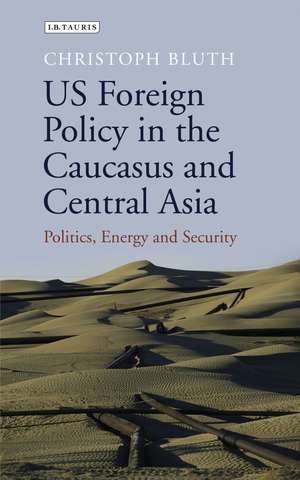US Foreign Policy in the Caucasus and Central Asia: Politics, Energy and Security
Autor Christoph Bluthen Limba Engleză Hardback – 15 dec 2013
Preț: 714.92 lei
Preț vechi: 1027.89 lei
-30% Nou
Puncte Express: 1072
Preț estimativ în valută:
136.80€ • 142.83$ • 113.22£
136.80€ • 142.83$ • 113.22£
Carte tipărită la comandă
Livrare economică 04-18 aprilie
Preluare comenzi: 021 569.72.76
Specificații
ISBN-13: 9781780769189
ISBN-10: 1780769180
Pagini: 280
Ilustrații: 2 maps
Dimensiuni: 138 x 216 x 30 mm
Greutate: 0.5 kg
Editura: Bloomsbury Publishing
Colecția I.B.Tauris
Locul publicării:London, United Kingdom
ISBN-10: 1780769180
Pagini: 280
Ilustrații: 2 maps
Dimensiuni: 138 x 216 x 30 mm
Greutate: 0.5 kg
Editura: Bloomsbury Publishing
Colecția I.B.Tauris
Locul publicării:London, United Kingdom
Notă biografică
Christoph Bluth is Professor of International Studies at the University of Leeds.
Cuprins
ContentsChapter 1: Introduction: US National Security and the Caspian Region3Understanding US National Security after the Cold War: Theoretical Approaches5Structural Realism7The Role of Ideas10Organisational Behaviour and Decision-Making Theories17The United States and the Caspian Region19Research Questions and Methodology29Chapter 2: The Geopolitics of the Region36Russian Security Policy at the Southern Periphery40Conflict and Peacekeeping in the Caucasus and Central Asia57The Geopolitics of the Caspian Region: The Major Powers61China61Iran66Turkey69The European Union70Regional Security Organisations71The Collective Security Treaty Organisation71The Shanghai Cooperation Organisation76GUAM79The Global War against Terrorism and the Geopolitics of the Caspian Region80Chapter 3: Engaging with the Caspian Region - US National Interests in the Post-Soviet Era84The United States and the Former Soviet Space84Engaging Central Asia and Pipeline Politics96The Bush Administration and US National Security Interests in Central Asia104The Impact of 9-11105Engaging Central Asia109Conclusion114Chapter 4: US Policy towards the Caspian Region: The Security Dimension117Cooperative Threat Reduction in Central Asia123Conflict Regions in the Former Soviet Space127Armenia and Azerbaijan128Georgia138Tajikistan143US Military Engagement in Central Asia145Terrorism148The Case of Uzbekistan153Security and Democracy160Appendix to Chapter 4171Chapter 5: The United States and Energy Resources in the Caspian Region173US Energy Policy and the Caspian Region175The Structure of Caspian Hydrocarbon Resources176Kazakhstan's Oil Production and US Interests180Kazakhstan as an Energy Producer186The Battle of the Pipelines188US Policy towards Caspian Oil and Gas Resources in the Bush Administration195Conclusion198Appendix to Chapter 5201Chapter 6: Conclusion202The Obama administration and the trajectory of US policy towards the Caspian region217Bibliography21








